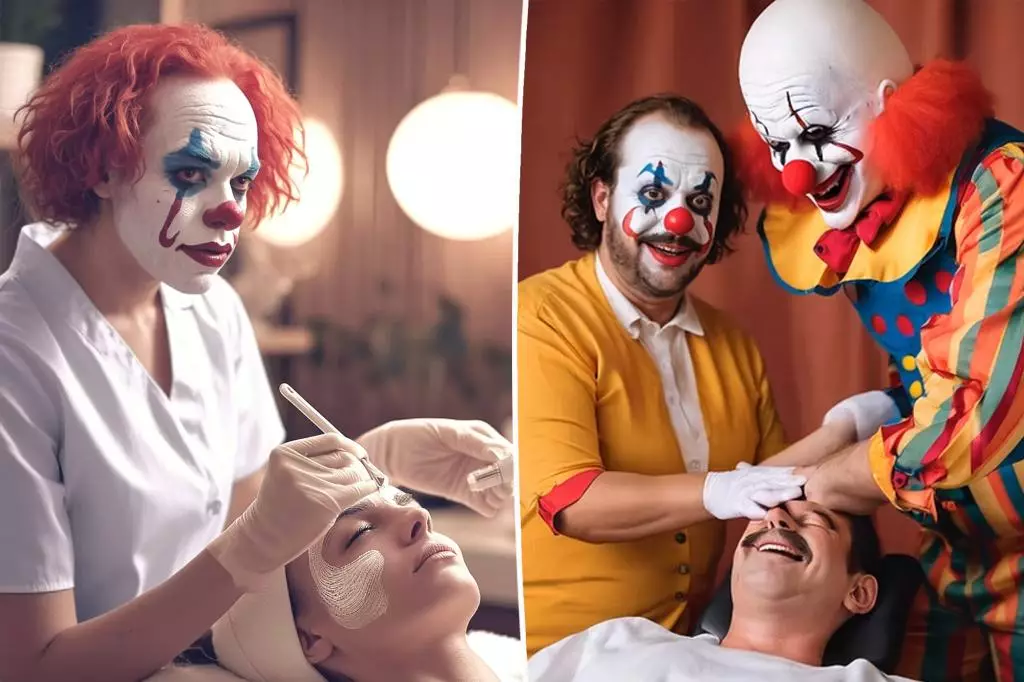The Hamptons summer season has long been synonymous with opulence and the pursuit of wellness. Yet this year, an anonymous prankster, or perhaps a collaborative group of mischief-makers, has sparked a refreshingly absurd twist on the wellness culture that defines this elite enclave. Enter the “East Hampton Clown Massage,” a parody that pokes fun at the often nebulous realm of alternative healing practices. Through a cheeky website and hilarious offerings, the masterminds behind this campaign invite locals and visitors alike to engage in their ludicrous clown-based therapies, promising everything from “Scream Therapy” to “Joeky Reiki Bakey.”
As the website cheekily purports, clown massage is not merely a gimmick; it’s a sophisticated art form that promises to bring joy and healing by integrating humor with holistic health. By satirizing the serious tone often associated with wellness retreats, this initiative invites participants to rediscover the healing power of laughter in a world beset by tension and anxiety. The creators’ keen understanding of the local lore, such as their entertaining nod to infamous socialite Lizzie Grubman, showcases both wit and insider knowledge that elevates the prank beyond mere surface-level mockery.
Clowning Around: The Healing Power of Laughter
The hilarious concept unfolds through the absurd “treatments” advertised on their website, which includes the laugh-inducing “Tummy Tickle” and the euphoric “Laugh” therapy. At its essence, this joyful enterprise challenges the often pretentious and self-important nature of wellness culture in the Hamptons. Instead of hushed tones and serene backgrounds that define so many wellness practices, the idea of a clown giving a massage serves as a social commentary on the absurdity of both wellness trends and high-society quirks.
Moreover, the apparent emphasis on rigorous credentials, with Joeky claiming to have graduated from “Le Ecole de Clown Massage” and being a cryptocurrency “thought leader,” underscores the lighthearted absurdity of contemporary wellness culture. It holds a mirror up to the social elite—their obsession with credentials often eclipsing tangible benefits, and thus challenges them to reconsider what constitutes value in health and wellbeing.
The Role of Satire in Social Commentary
The brilliance of this prank lies not just in the hilarity, but in its ability to provoke thought among Hamptons inhabitants. It deftly highlights the intersection of wealth, privilege, and personal wellness while navigating the thin line between comedy and critique. The humor offered by pseudonymous characters like “Giggles” and “Krusty,” who purportedly cater to a roster of A-list clients and espouse pseudo-scientific approaches, adds an extra layer of entertainment while simultaneously questioning the ethical boundaries of modern wellness practices.
The over-the-top testimonials and outrageous fake endorsements serve to disarm critics who may dismiss this initiative as mere slapstick. Instead, it encourages deeper reflection on the sincerity—or lack thereof—present in real wellness narratives. Are we so immersed in the pursuit of “the next big thing” in health and wellness that we are blind to what truly matters?
This campaign also draws attention to the age of misinformation and the importance of critical thinking. By creating a spoof that incorporates recognizable references and cleverly constructed absurdity, it brilliantly invites audiences to interrogate what they consume in both media and daily life. The playful subversion encourages a more discerning interaction with wellness culture, reminding us that laughter often offers the most profound healing of all.
Who’s Behind the Masks?
Despite the layers of jest, the true identities of the creators remain shrouded in mystery, adding to the intrigue around the campaign. They deftly navigate this mystery by crafting riveting fake interviews, including an audacious mock feature in Vanity Fair with Joeky discussing “the integrity of the brand.” The calculated absurdity is further evidenced through outlandish claims of private jet travels and lavish lifestyles that parody the elite existential crises surrounding wellness.
What remains curious is the potential impact of this parody on actual wellness businesses within the Hamptons. Is it merely an elaborate joke, or could it provoke a genuine shift in how wellness is perceived and engaged within this community? In an era where authenticity is increasingly prized, perhaps this playful rebellion against the status quo will inspire a more sincere approach to the culture of wellness, setting the stage for a new kind of healing—one grounded in both humor and honesty.

